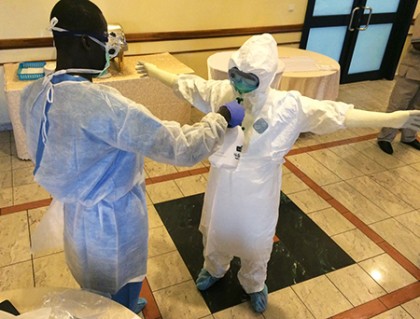As part of its ongoing efforts to prevent the spread of Ebola virus disease in West Africa, Jhpiego, an international health non-profit and Johns Hopkins University affiliate, is bringing health officials and clinicians from across the region to Ghana for specialized training in infection prevention to prepare for future health emergencies.

Image credit: Jhpiego/Chantelle Allen
Jhpiego technical experts will hold two workshops this month for Ministry of Health officials, physicians, nurses, other clinicians, and expert trainers to share the latest in infection prevention and control interventions through a new training package titled "Prevention and Control of Ebola Virus Disease in Health Care Facilities with Limited Resources." The package was developed through a collaboration between Jhpiego and the Department of Hospital Epidemiology and Infection Control at Johns Hopkins Hospital. In these workshops, participants will be equipped to train additional frontline health workers and supervisors on best practices to protect themselves and their patients in health facilities should an outbreak occur in their respective countries.
"Our goal is twofold—to assist the governments of West Africa in establishing a level of workplace preparedness and health care provider confidence for any infectious disease emergency, and to provide specific guidelines for the outbreak now under way," said Leslie Mancuso, Jhpiego's president and CEO. "In countries already impacted by Ebola, we have a special concern. Gains made in reducing maternal and newborn deaths are eroding because many health facilities have shut down services for pregnant women and newborns, leaving them at increased risk. We want to strengthen infection prevention and control and workplace standards so maternal health services can be restored safely and with key protections in place so women and families can receive the care they desperately need."
Since the summer, Jhpiego has been working closely with ministries of health in Liberia, Guinea, and Nigeria to reinforce and strengthen infection prevention and control measures, build capacity of health workers to carry out these guidelines, and ensure workplace and health care provider safety. The training sessions will build on Jhpiego's work in the Ebola-impacted countries to ensure that neighboring countries are prepared for a similar crisis.
More than 40 participants from Burkina Faso, Cameroon, Chad, Côte d'Ivoire, Togo, Guinea, Ghana, and Nigeria have been invited to Accra—Ghana'as capital—for training sessions designed for both French- and English-speaking participants. Jhpiego senior clinicians Chandrakant Ruparelia and Willibrord Shasha, along with Melanie Curless, a nurse and infection prevention epidemiologist from the Department of Hospital Epidemiology and Infection Control at Johns Hopkins Hospital, will provide technical updates on Ebola and reinforce standard infection prevention and control practices required in health care settings. The next phase of the training will focus on developing workshop participants as trainers capable of providing competency-based training on Ebola preparedness for other health facility staff.
Although personal protective equipment is used in many health care environments, adherence to protocols is especially important in an Ebola treatment setting. The training package was developed to address the rigorous protocols required under such challenging conditions.
"There is no room for mistakes," Shasha said. "The donning and, especially, removal of personal protective equipment are very critical and have to be learned meticulously."








